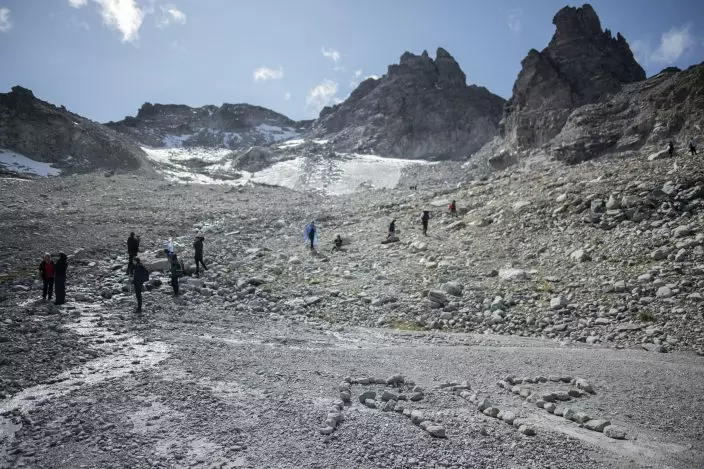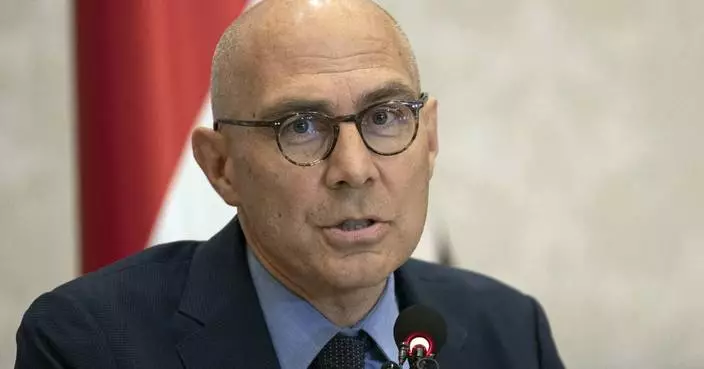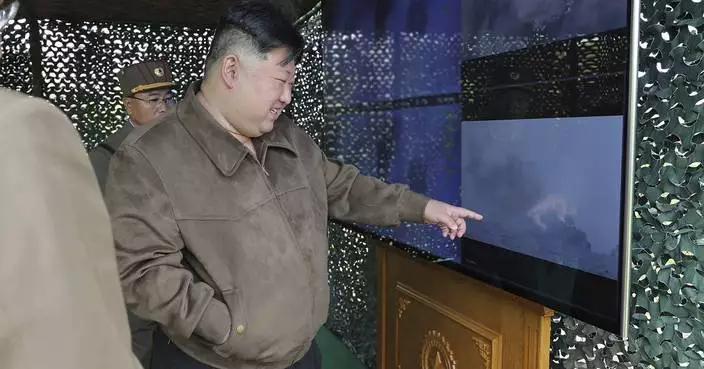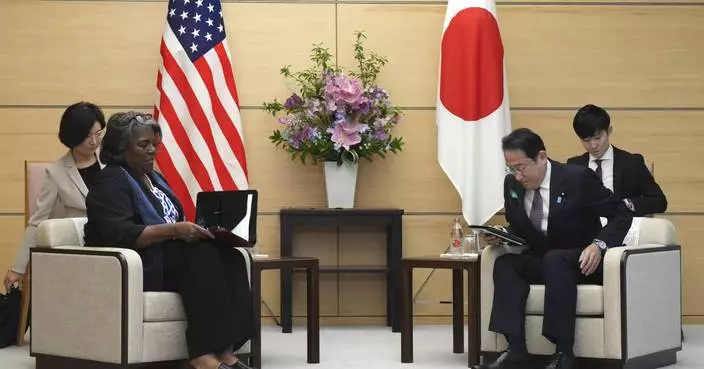Saying humanity is waging war with the planet, the head of the United Nations isn't planning to let just any world leader speak about climate change at Monday's special "action summit."
Only those with new, specific and bold plans can command the podium and the ever-warming world's attention, Secretary-General Antonio Guterres said.
So sit down Brazil. Sit down Saudi Arabia. Sit down Poland

The letters 'RIP' (rest in peace) are written with stones during a commemoration in front of the 'dying' glacier of Pizol mountain in Wangs, Switzerland, Sunday, Sept. 22, 2019. Various organizations gathered to shine a light on climate change and melting glaciers. (Gian EhrenzellerKeystone via AP)
"People can only speak if they come with positive steps. That is kind of a ticket," Guterres said. "For bad news don't come."
As if to underscore the seriousness of the problem, the U.N.'s World Meteorological Organization released a quick science report Sunday showing that in the last several years, warming, sea level rise and carbon pollution have all accelerated.
Brazil's, Poland's and Saudi Arabia's proposals for dealing with climate change fell short, so they're not on Monday's summit schedule. The United States didn't even bother, according to a U.N. official, who spoke on condition of anonymity.
The bar isn't that high: Leaders from 64 nations, the European Union, more than a dozen companies and banks, a few cities and a state will present plans at the secretary-general's Climate Action Summit.
Guterres wants nations to be carbon-neutral by 2050 — in other words, they will not add more heat-trapping greenhouse gases into the air than are removed by plants and perhaps technology each year. On Sunday, 87 countries around the world pledged to decarbonize in a way consistent with one of the international community's tightest temperature goals.
There is a sense of urgency, Guterres said, because "climate change is the defining issue of our time."
"For the first time, there is a serious conflict between people and nature, between people and the planet," Guterres said.
He wants countries to commit to no new coal power plants after 2020 and reduce carbon pollution by 45% in the next century. The purpose of the summit is to come up with new green proposals a year earlier than the 2020 deadline that is in the 2015 Paris climate agreement.
World leaders agreed in 2009 to try to keep warming to just 2 degrees Celsius (3.6 degrees Fahrenheit) since pre-industrial times. Then in 2015 they added a secondary, tougher goal, at the urging of small islands, to keep warming to just 1.5 degrees Celsius (2.7 degrees Fahrenheit).
The new weather agency report showed that the world has warmed already by 1.1 degrees Celsius (2 degrees Fahrenheit). So that means the goals are to limit further warming to 0.9 degrees Celsius (1.6 degrees Fahrenheit) from now or even 0.4 degrees Celsius (0.72 degrees Fahrenheit) from now.
Efforts to reduce carbon pollution need to be tripled to keep from hitting the 2-degree Celsius mark and must increase fivefold to limit warming to 1.5 degrees Celsius since pre-industrial times, the World Meteorological Organization report said.
As bad as that sounds, it's wrong and overly optimistic to use the mid-1880s as the benchmark, said Pennsylvania State University climate scientist Michael Mann. Mann said that many studies, including the WMO's, are overlooking that the world has warmed 0.2 degrees Celsius (0.36 degrees Fahrenheit) from human causes since the mid-1700s.
The weather agency said the last five years were the warmest five on record and even 0.2 degrees Celsius (0.36 degrees Fahrenheit) hotter than the first half of the decade, a significant jump in just a few years.
"There is a growing recognition that climate impacts are hitting harder and sooner than climate assessments indicated even a decade ago," the 28-page report said.
A larger, more international report looking at climate change and oceans and ice will be released by the Intergovernmental Panel on Climate Change on Wednesday.
"This new WMO report highlights the importance of making more progress on reducing emissions of carbon dioxide," Cornell University climate scientist Natalie Mahowald said. "Hopefully this latest U.N. Climate Summit will motivate more action."
UNITED NATIONS (AP) — Russia on Wednesday vetoed a U.N. resolution sponsored by the United States and Japan calling on all nations to prevent a dangerous nuclear arms race in outer space, calling it “a dirty spectacle” that cherry picks weapons of mass destruction from all other weapons that should also be banned.
The vote in the 15-member Security Council was 13 in favor, Russia opposed and China abstaining.
The resolution would have called on all countries not to develop or deploy nuclear arms or other weapons of mass destruction in space, as banned under a 1967 international treaty that included the U.S. and Russia, and to agree to the need to verify compliance.
U.S. Ambassador Linda Thomas-Greenfield said after the vote that Russian President Vladimir Putin has said Moscow has no intention of deploying nuclear weapons in space.
“Today’s veto begs the question: Why? Why, if you are following the rules, would you not support a resolution that reaffirms them? What could you possibly be hiding,” she asked. “It’s baffling. And it’s a shame.”
Russia’s U.N. Ambassador Vassily Nebenzia dismissed the resolution as “absolutely absurd and politicized,” and said it didn’t go far enough in banning all types of weapons in space.
Russia and China proposed an amendment to the U.S.-Japan draft that would call on all countries, especially those with major space capabilities, “to prevent for all time the placement of weapons in outer space, and the threat of use of force in outer spaces.”
The vote was 7 countries in favor, 7 against, and one abstention and the amendment was defeated because it failed to get the minimum 9 “yes” votes required for adoption.
The U.S. opposed the amendment, and after the vote Nebenzia addressed the U.S. ambassador saying: “We want a ban on the placement of weapons of any kind in outer space, not just WMDs (weapons of mass destruction). But you don’t want that. And let me ask you that very same question. Why?”
He said much of the U.S. and Japan’s actions become clear “if we recall that the U.S. and their allies announced some time ago plans to place weapons … in outer space.”
Nebenzia accused the U.S. of blocking a Russian-Chinese proposal since 2008 for a treaty against putting weapons in outer space.
Thomas-Greenfield accused Russia of undermining global treaties to prevent the spread of nuclear weapons, irresponsibly invoking “dangerous nuclear rhetoric,” walking away from several of its arms control obligations, and refusing to engage “in substantive discussions around arms control or risk reduction.”
She called Wednesday’s vote “a real missed opportunity to rebuild much-needed trust in existing arms control obligations.”
Thomas-Greenfield’s announcement of the resolution on March 18 followed White House confirmation in February that Russia has obtained a “troubling” anti-satellite weapon capability, although such a weapon is not operational yet.
Putin declared later that Moscow has no intention of deploying nuclear weapons in space, claiming that the country has only developed space capabilities similar to those of the U.S.
Thomas-Greenfield said before the vote that the world is just beginning to understand “the catastrophic ramifications of a nuclear explosion in space.”
It could destroy “thousands of satellites operated by countries and companies around the world — and wipe out the vital communications, scientific, meteorological, agricultural, commercial, and national security services we all depend on,” she said.
The defeated draft resolution said “the prevention of an arms race in outer space would avert a grave danger for international peace and security.” It would have urged all countries carrying out activities in exploring and using outer space to comply with international law and the U.N. Charter.
The draft would have affirmed that countries that ratified the 1967 Outer Space Treaty must comply with their obligations not to put in orbit around the Earth “any objects” with weapons of mass destruction, or install them “on celestial bodies, or station such weapons in outer space.”
The treaty, ratified by some 114 countries, including the U.S. and Russia, prohibits the deployment of “nuclear weapons or any other kinds of weapons of mass destruction” in orbit or the stationing of “weapons in outer space in any other manner.”
The draft resolution emphasized “the necessity of further measures, including political commitments and legally binding instruments, with appropriate and effective provisions for verification, to prevent an arms race in outer space in all its aspects.”
It reiterated that the U.N. Conference on Disarmament, based in Geneva, has the primary responsibility to negotiate agreements on preventing an arms race in outer space.
The 65-nation body has achieved few results and has largely devolved into a venue for countries to voice criticism of others’ weapons programs or defend their own. The draft resolution would have urged the conference “to adopt and implement a balanced and comprehensive program of work.”
At the March council meeting where the U.S.-Japan initiative was launched, U.N. Secretary-General António Guterres warned that “geopolitical tensions and mistrust have escalated the risk of nuclear warfare to its highest point in decades.”
He said the movie “Oppenheimer” about Robert Oppenheimer, who directed the U.S. project during World War II that developed the atomic bomb, “brought the harsh reality of nuclear doomsday to vivid life for millions around the world.”
“Humanity cannot survive a sequel to Oppenheimer,” the U.N. chief said.

United States Ambassador and Representative to the United Nations Linda Thomas-Greenfield addresses members of the U.N. Security Council before voting during a meeting on Non-proliferation of nuclear weapons, Wednesday, April 24, 2024 at United Nations headquarters. (AP Photo/Eduardo Munoz Alvarez)

FILE - U.S. Ambassador to United Nations Linda Thomas-Greenfield speaks on Thursday, April 18, 2024, in Tokyo. The U.N. Security Council is set to vote Wednesday, April 24, 2024, on a resolution announced by Thomas-Greenfield, calling on all nations to prevent a dangerous nuclear arms race in outer space. It is likely to be vetoed by Russia. (AP Photo/Eugene Hoshiko, Pool, File)












